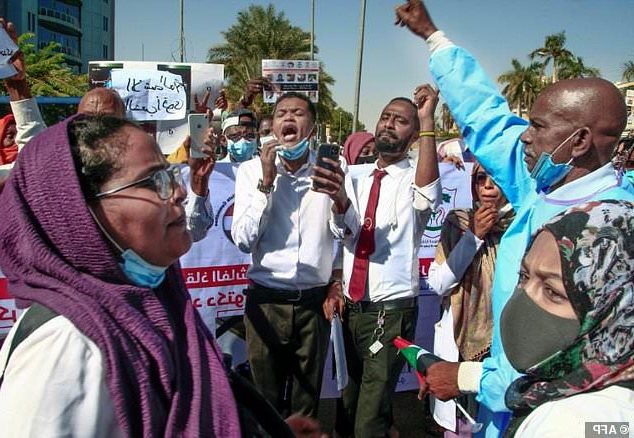Sudanese doctors have held a protest rally to voice their deep dissent against the violent crackdown on medical personnel during pro-democracy protests following a much-condemned military coup in October.
The Sunday demonstration was the latest in a series of protest rallies held in crisis-hit Sudan, where security forces press ahead with their attacks on anti-coup protests across the African country.
“During every protest, they fire tear gas inside the hospital where I work,” one doctor said at the rally in capital Khartoum.
“They even attack us inside the intensive care unit,” she added at the rally, where medical personnel carried pictures of colleagues they said had been killed.
More than two years ago, massive anti-government demonstrations hit Sudan, mostly over the economy. The protesters, youths for a large part, demanded the resignation of then-President Omar al-Bashir.
Bashir was ultimately deposed through a military coup in April 2019, after ruling over the country for three decades. In August the same year, a transitional civilian-military administration was founded to run the country.
However, Sudan’s military chief and de facto leader Abdel Fattah al-Burhan staged a coup on October 25 and dissolved the fragile government.
Abdalla Hamdok, the then-prime minister, was detained and put under house arrest in a move that infuriated the Sudanese and sparked international outcry, including from the UN Security Council. Other civilian leaders were also held in military detention.
READ ALSO: Queen Elizabeth strips Prince Andrew of titles
Hamdok was later released and on November 21 signed a power-sharing deal with the Burhan-led junta, according to which the former would continue his career as prime minister, all political prisoners detained during the coup would be released, and a 2019 constitutional declaration would be the basis for a political transition.
According to the deal, July 2023 has been set as the date for Sudan’s first free elections since 1986.
The coup infuriated the Sudanese and triggered new waves of protests across the country, sparking an international outcry, including from the UN Security Council.
On January 2, Hamdok resigned, leaving the military fully in charge. He said Sudan was at a “dangerous crossroads threatening its very survival.”
At least 64 people have been killed during the security crackdown on the anti-coup protests since the October coup, medics say, noting that many of them were shot dead by security forces.
Last week, the UN’s World Health Organization (WHO) said that there had been 11 confirmed attacks on Sudanese health facilities since November.
It further said that it was “also aware of the interception of ambulances, medical personnel, and patients during their attempts to seek safety.”
WHO also called for the attacks to “stop now”, in a time that healthcare services are needed more than ever during the current pandemic of the COVID-19, which is a “grave threat” for Sudan, where 94 percent of the population has not yet been vaccinated.
Official figures have confirmed 93,973 COVID-19 cases and some 4,000 have so far lost their lives. In September, Khartoum said that 64 percent of around 1,000 health workers tested had been found to be COVID-positive.
The African country, home to 45 million people, is also dealing with a severe economic crisis and inflation reaching 400 percent.
Separately on Sunday, hundreds of protesters blocked key roads in the Northern Province, 350 kilometers from Khartoum. They were angered by news that electricity prices would double.
“No vehicle will pass until the authorities have canceled this increase, because it signs the death certificate of our agriculture,” said a protester.
The United Nations has already announced that it has a plan to invite military leaders, political parties, and other groups in Sudan to participate in a “political process” aimed at resolving the current crisis.
However, the Sudanese Professionals Association, an independent trade union confederation and one of the major organizers of the protests, said it completely rejects the UN initiative.
Separately on Sunday, hundreds of protesters blocked key roads in the Northern Province, 350 kilometers from Khartoum. They were angered by news that electricity prices would double.
“No vehicle will pass until the authorities have canceled this increase, because it signs the death certificate of our agriculture,” said a protester.
The United Nations has already announced that it has a plan to invite military leaders, political parties, and other groups in Sudan to participate in a “political process” aimed at resolving the current crisis.
However, the Sudanese Professionals Association, an independent trade union confederation and one of the major organizers of the protests, said it completely rejects the UN initiative.













